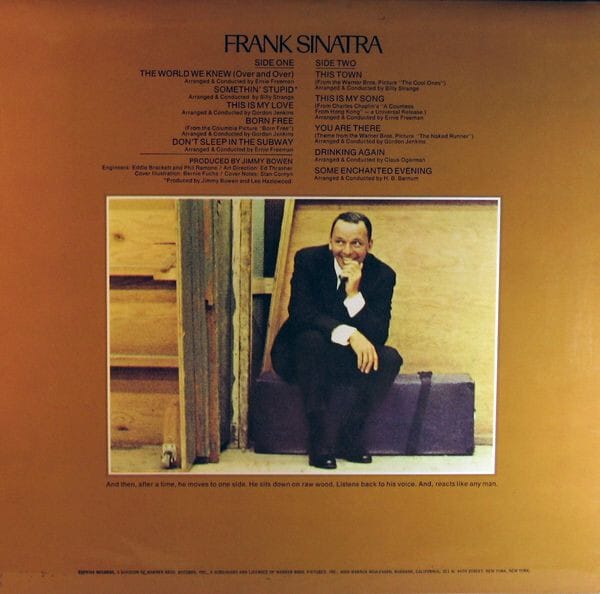SOMETHING STUPID

"More of a singles collection than a proper album [...] Much of this has a rock-oriented pop production, complete with fuzz guitars, reverb, folky acoustic guitars, wailing harmonicas, drum kits, organs, and brass and string charts that punctuate the songs rather than provide the driving force [...] the songs Sinatra tackles with a variety of arrangers are more ambitious than most middle-of-the-road, adult-oriented soft rock of the late '60s." - Stephen Thomas Erlewine
One of my secret favourite late-60s Frank Sinatra albums from his prime Reprise era is The World We Knew. On it, the artist seems to rage against the dimming light of his generation’s time in the spotlight, set against a counterculture fracturing America in dynamic and fascinating ways. This might just be the Cliff Booth of Frank albums, alongside Cycles and A Man Alone (songs and poems of Rod McKuen), where Sinatra charts uncertain waters at a moment when he was rapidly becoming a dinosaur in the eyes of the younger generation—yet still trying to defy the gravity of becoming yesterday’s man. Speaking of which, Sinatra’s version of “Yesterday” has always seemed the best to me, because he truly sounds as though he’s worried about being consigned to it as a concept.
Listening to The World We Knew today feels like experiencing a midlife identity crisis in hi-fi long-player form—and I love it for exactly that reason. Moving from the lounge-y, faux-rock-style angst of “The World We Knew (Over and Over)” to his iconic duet with daughter Nancy, “Something Stupid,” to the transcendent title song Born Free, and then to Petula Clark’s hyper-poppy “Don’t Sleep in the Subway” should, by rights, be a recipe for booking a therapist’s couch—but somehow it all hangs together beautifully, like a drunk tapestry that accidentally becomes a masterpiece.
“This Town” has that grimy, white-man-trying-to-go-ghetto vibe (complete with Ray Charles–style organ), while “This Is My Song” (written by Charlie Chaplin) carries the graceful momentum of a whirling carousel, fairground horses moving seamlessly up and down in a race to nowhere.
The penultimate track, “Drinking Again,” could be Frank’s way of saying it was the booze that did this. And yet, before the hangover sets in, he closes with a counterintuitively upbeat (almost honky-tonk) version of Rodgers and Hammerstein’s “Some Enchanted Evening.”
Maybe that was the vibe in the Sgt. Pepper year of 1967: keep being a moving target (or, as Peter Falk’s character in The In-Laws shouts, “Turpentine!”) so the young shooters couldn’t get you. In a decade of assassinations, perhaps Sinatra was doing all he could to stumble into the ’70s in one piece (hairpiece).